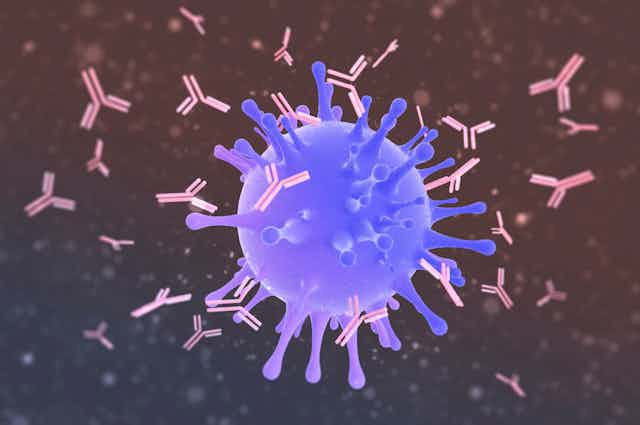Antibodies are part of us – literally.
We have billions of them in our bodies with a combined weight of about 100 grams, or about the weight of a bar of soap. If there are so many antibodies inside our bodies then they must be safe and very important, right?
Indeed, antibodies are perhaps the safest type of therapy and have many important functions. One of them is to protect and cure infections caused by viruses. The human immune system can produce antibodies specific for each type virus that bind strongly to the virus and block it from infecting our cells – so-called neutralizing antibodies.
I am an infectious disease scientist and am interested in antibody therapeutics because they are a relatively safe way to prevent severe disease and save lives, particularly when a new, deadly virus emerges.
To stop the spread of COVID-19, billions of people will need to have antibodies to protect against the new coronavirus. So the question is how can we isolate and produce neutralizing antibodies in large enough quantities to serve everyone who needs them, including research laboratories and pharmaceutical companies?
What are antibodies?
Our immune system makes antibodies in response to a foreign pathogen, whether that be a bacterium, virus or fungi.
Antibodies are Y-shaped blood proteins made by white blood cells called “B cells.” They neutralize pathogens by attaching to their surface, blocking them from entering our cells and signaling our immune system to clear the pathogen from our bodies.
Humans have all sorts of different antibodies floating around inside us at any given time looking for foreign pathogens to attack. When a specific virus, such as SARS-CoV-2, infects our bodies, our immune system will try to produce enough specific antibodies against it before the infection becomes overwhelming.
This process can happen faster and be more successful in preventing infection if we already have existing antibodies against the pathogen.

Finding antibodies to treat COVID-19
When I was in my native country of Bulgaria, I was fascinated with so-called hybridoma technology and used it to produce monoclonal antibodies (mAbs) – “mono” meaning “one,” or one defined antibody with known affinity for a specific pathogen. Later, at the National Institutes of Health, my team used a very powerful method called phage display to discover highly specific, potent human mAbs against many viruses, including SARS-CoV, MERS-CoV, and Hendra and Nipah viruses.
Now, at the University of Pittsburgh, we’ve discovered potent neutralizing mAbs against SARS-CoV-2 using phage display. We are conducting animal experiments now and expect to publish our results soon in a peer-reviewed journal. The sequence of the most effective and safe mAb will be provided to a company which will insert the gene that encodes the antibody into cells to produce large quantities of the antibody for studies in human clinical trials.
There is also a method to extract B-cells from patients who survived SARS-CoV-2 infections, select the ones which produce the most effective specific antibodies and then grow those cells in cultures in the lab. These lab-grown B-cells then function as little factories to produce neutralizing mAbs. A recent study published in Science described the work of scientists from China who used this method to identify two such antibodies.
The Chinese researchers showed in an animal model of SARS-CoV-2 infection – in which mice were engineered with the human ACE2 receptor that enables the virus to infect cells – that these mAbs were effective at blocking the virus. Another paper published in Cell using the same model reported a similar finding.
Other published reports have described neutralizing SARS-CoV-2 mAbs but without evaluation in animal models.
Why are animal models so important? Because there are many other factors that could affect antibody efficacy in a living organism that can’t be simulated in a petri dish. For example, how long are mAbs functional in the body and are they safe? Animal models can provide preliminary safety data. Beyond animal models, a key mAb property to consider is whether it can be efficiently manufactured in a stable, safe form for human use.
Based on the published studies I mentioned, media reports, the generally favorable attributes of antibodies and my own experience, I believe mAbs to SARS-CoV-2 will be approved this year for prevention and treatment of COVID-19.
[You need to understand the coronavirus pandemic, and we can help. Read The Conversation’s newsletter.]

